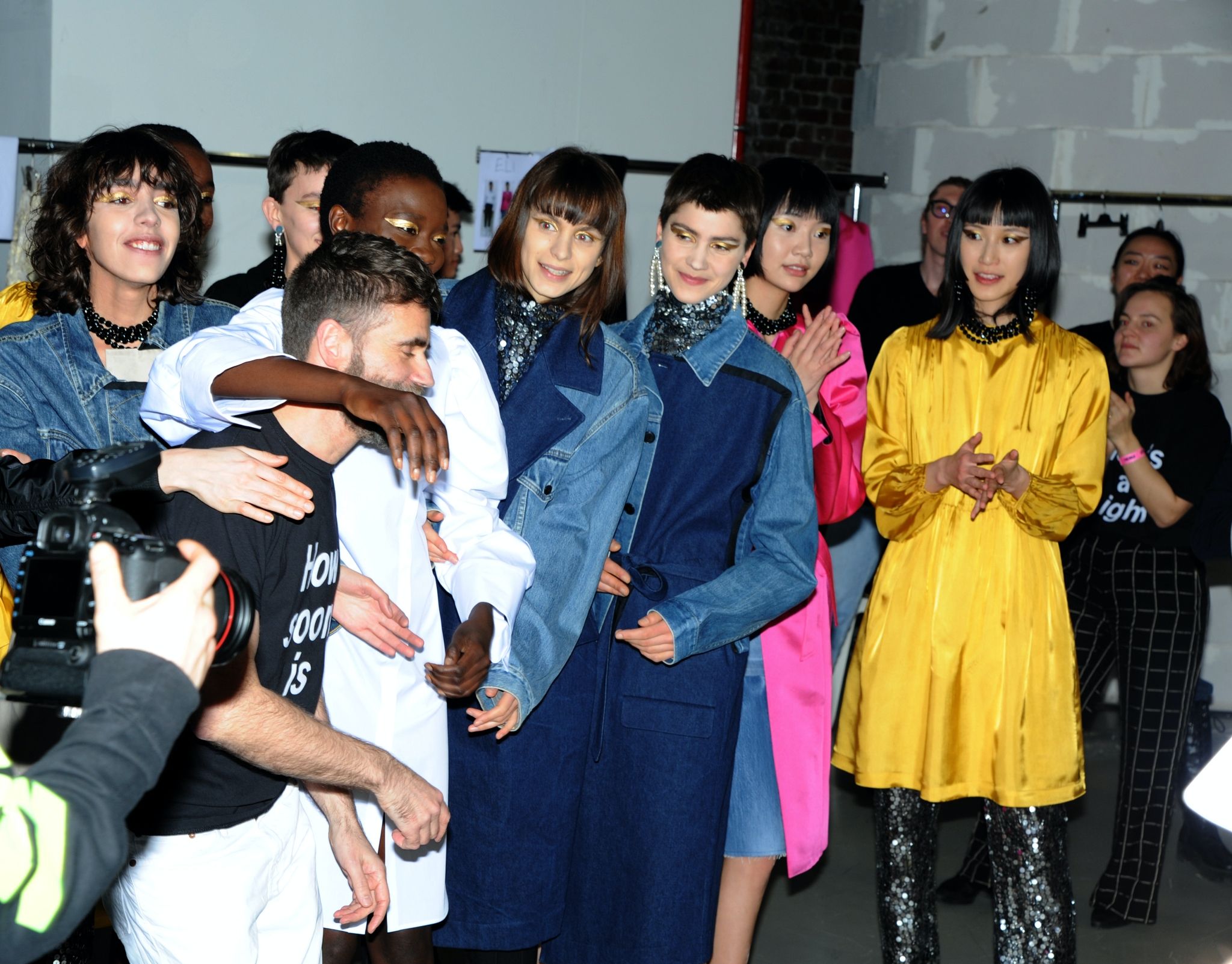
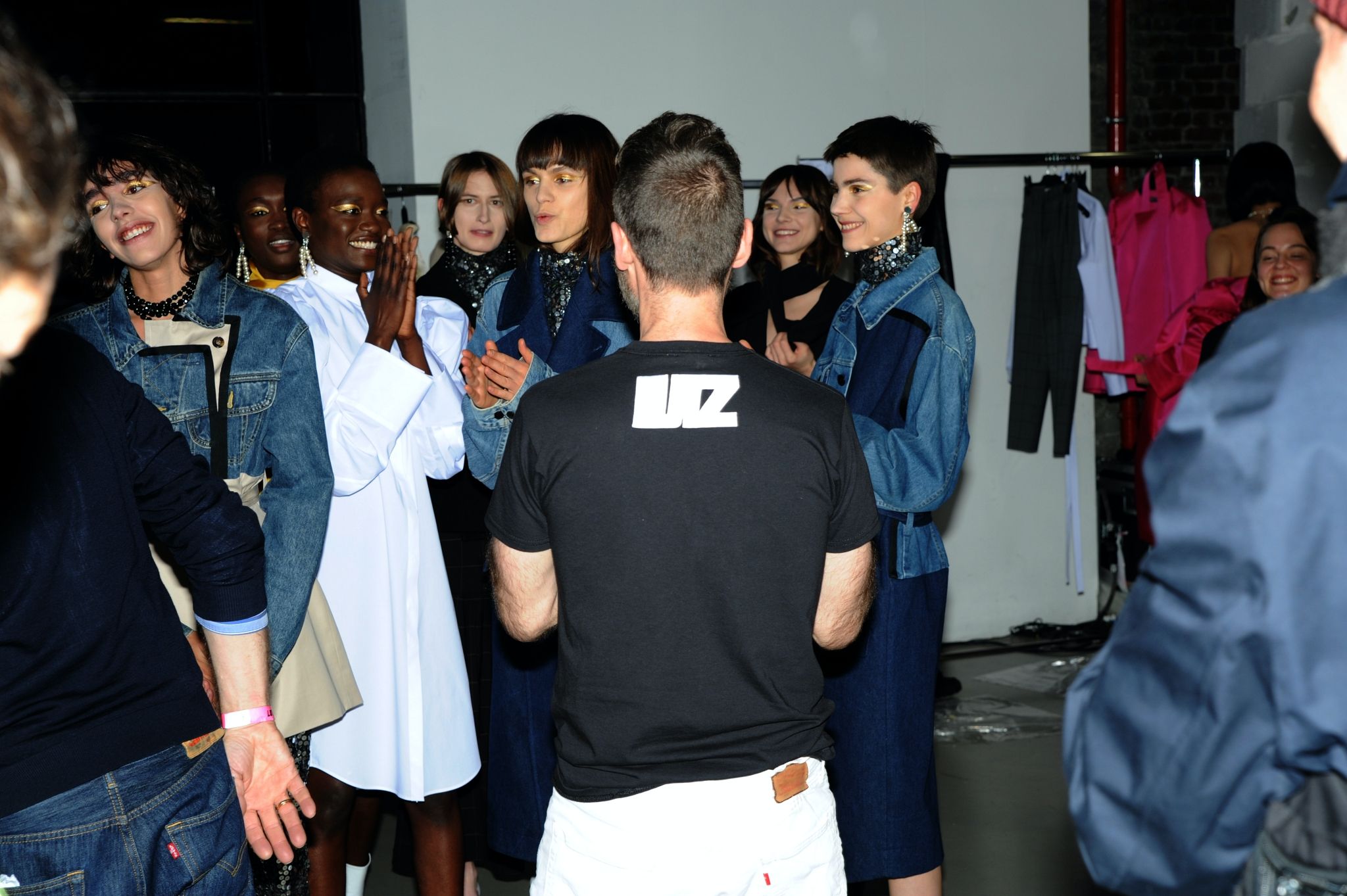
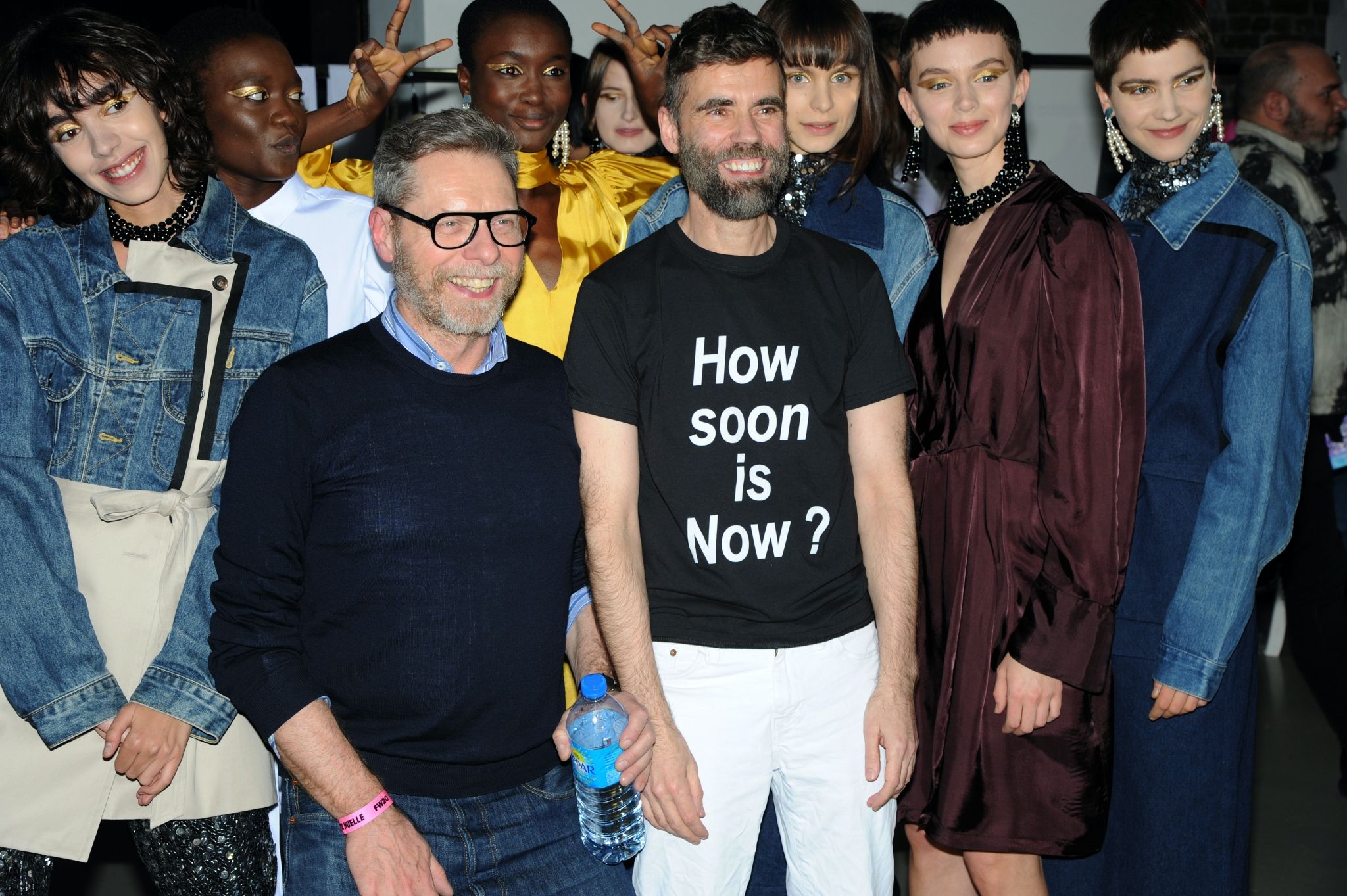
LUTZ HUELLE: Fashion made for
the people
APRIL 14, 2021 → WORDS JESÚS S FERRERA
A few days ago I jumped on a zoom call with Lutz Huelle. German fashion designer based in Paris at the helm of his eponymous independent label, which he has successfully combined with work for iconic and historical brands such as Brioni, MaxMara and Delpozo. It is undeniable that he has achieved harmony and a balance between the two, perhaps reserving the madness for his very own.
In an industry in which the ego can prevail, he stands for the people. He doesn’t want to be in the centre. Although he is aware that having his own brand is also a way of satisfying his ego, the people he is dressing has always been his greatest concern.
A few weeks ago he presented his Fall Winter 2021 collection at Paris Fashion Week. He has announced and described it as “the least conceptual collection” ever designed by himself. The world we are currently living in is already tough and confusing at times, something that Huelle doesn’t want to incorporate into his creative work. He refuses to confuse.
When asked about his utopian fashion industry he states that his biggest desire is for people to understand and appreciate everything that goes on behind a simple garment. There is love, there is passion, there are real people. Valuing the human aspect of it all is fundamental.
His words are honest and full of truth. His plans for the future in many respects may be blurred or undrawn, but they are clear on the most important thing: he wants to “go back into life again, whatever that means, and whatever that entails.” He is simply begging for a world with no more constraints.
First, I wanted to ask you how are you living these tough times. How has the social landscape changed you personally, and how has it changed the way you work?
Personally it has obviously changed me. It’s getting really hard now, to be honest. You don’t see people, you don’t go out for dinner or drinks anymore. It has made me realise how much I miss being with people. From that point of view I find it very difficult. It was kind of funny at the beginning, the first 2 weeks everything was new, Paris was completely empty, you could see no people. But once you get over the novelty of Paris being without people, it is not that nice anymore.
Regarding work, I have to say that it was interesting at the beginning, I had no clue what I was going to do. I normally go to the streets, I look at what people wear, how people dress, I travel to different places. It was nothing left in the way, so I had no idea what to get inspired by. Being always at home was obviously not really inspiring. But then I went back to what I was seeing at that moment: pyjamas, easy things... And I thought, “how can I turn that into something interesting?” Once that I had an idea, it became easier. But it is not the same as being able to go out and see things. It was an interesting exercise, but I’m kind of fed up with it now.
This situation has also led to general changes in the industry. How do you rate all of these changes? Do you think the fashion industry is going towards a better place?
I don’t know, to be honest. I have no idea how much of what people are saying now is going to be kept once the situation is better. I’m optimistic, so I hope that things will get better in many ways, there are so many things that should change. Apart from the sustainable aspect, it is also that so many clothes are made, they are all going to sale so quickly that there’s never a moment when people actually see the clothes properly in the stores. You can’t buy properly. There’s a new collection, it goes to the stores, and it goes on sales. The whole thing is so fast. I do hope that things will get better.
You said that people and traveling are some of your sources of inspiration. What else can you say about that matter?
When I first started, I just kept wondering how our lives were changing. I thought: people are going to go out much more, and they are not going to wear one outfit for the office, one outfit for the evening... I thought all these things were going to be mixed together. People were going to wear clothes that do all these things at once. Clothes that are multicultural, multifunctional. So when I first started I thought I did not want to have any limits to how I will design the collections. I mixed sport-wear, evening, menswear...
I was also looking at my friends, people around me. They are all dressing in such and easy and simple way. A simple t-shirt with a very expensive jacquard... Whatever. I think there was a big difference between how people were dressing and what I was seeing at fashion shows, and I was interested in how people were actually dressing.
Now that I’ve been doing this for a while, I always look at my own work. I always try to keep the last four seasons on my wall, and I look at what I like, what I think might be better, what is still interesting, what is old now, what I don’t like anymore. The Collection is always inspired by the preceding one.
I also look a lot at what people are wearing, the way clothes fall, the way fabrics move together.
And then, I’ve always loved music. I’ve always had a feeling in my head with what I listen to at the moment. That has always been a huge inspiration, but I can’t explain how, because it’s not visual, it’s something in my head. Music makes me feel a certain way.
There are also designers that I love: Pierre Cardin in the 60s or Comme des Garçons, which are still amazing.
But at the end of the day, it is always about who is the person that you are dressing. I like to dress people that care about fashion but not too much. Who would just put things on, who just want to look interesting or sexy but without being fashion victims. Something that is just easy, almost non-fashion.
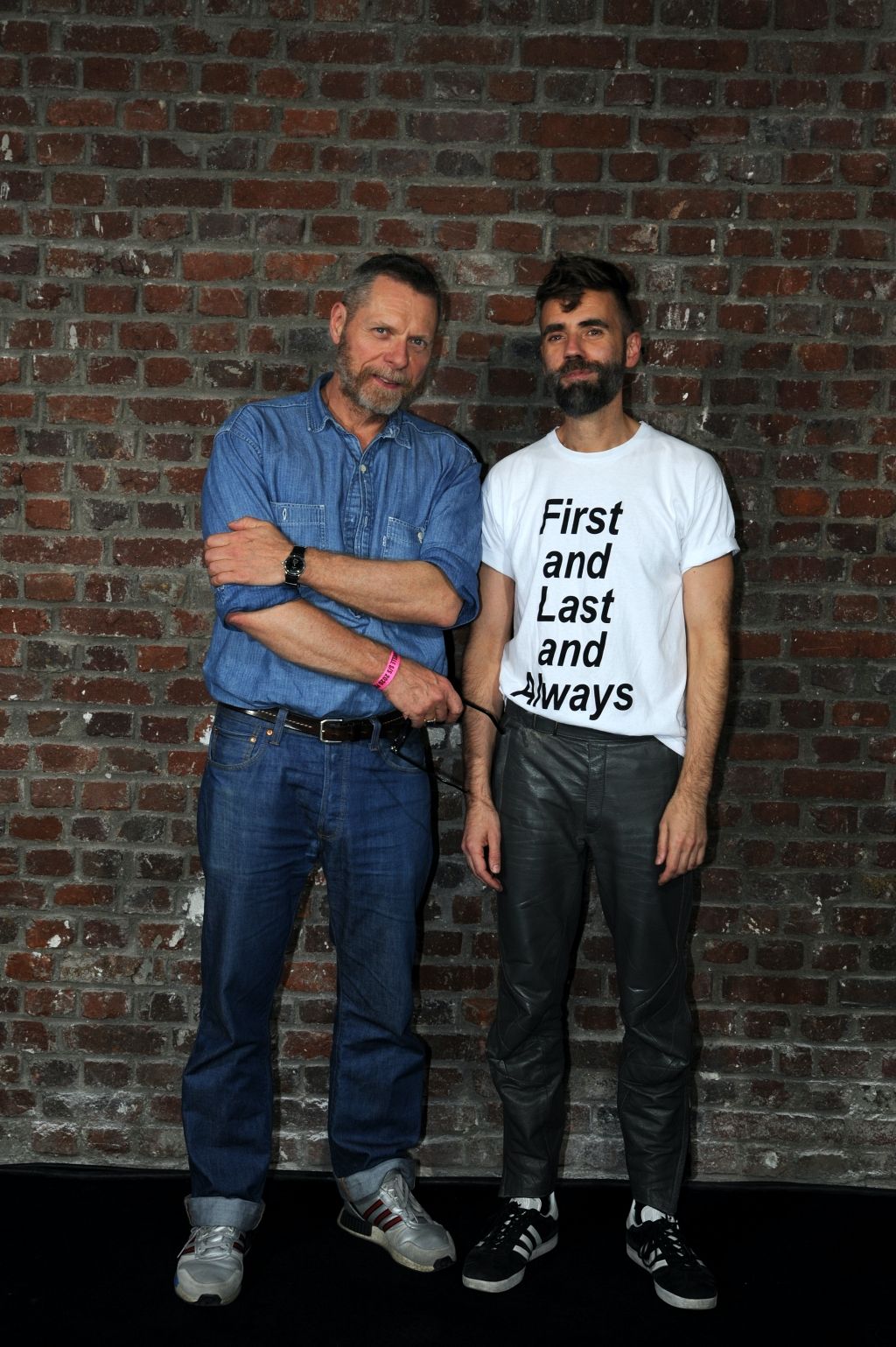
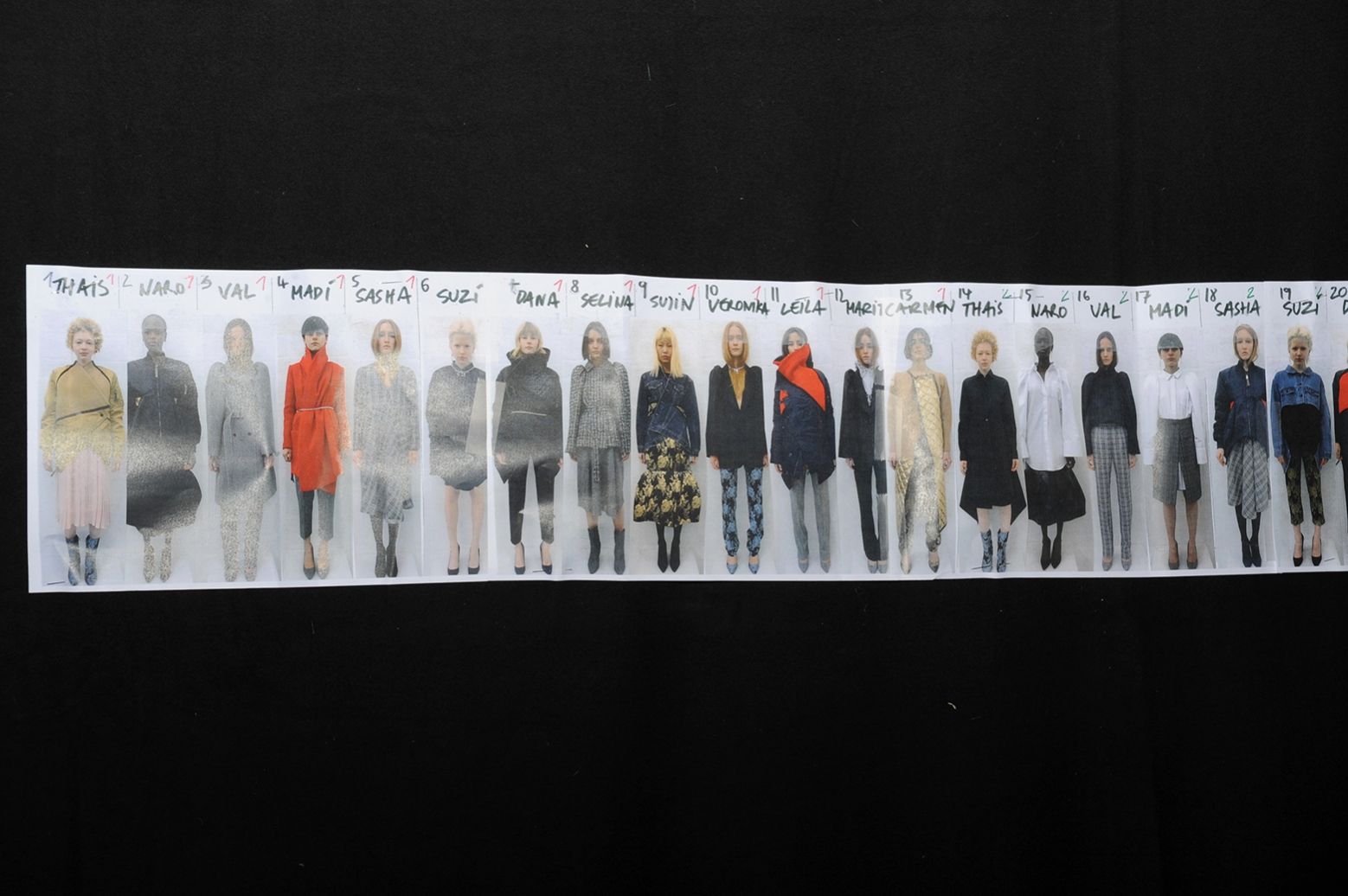
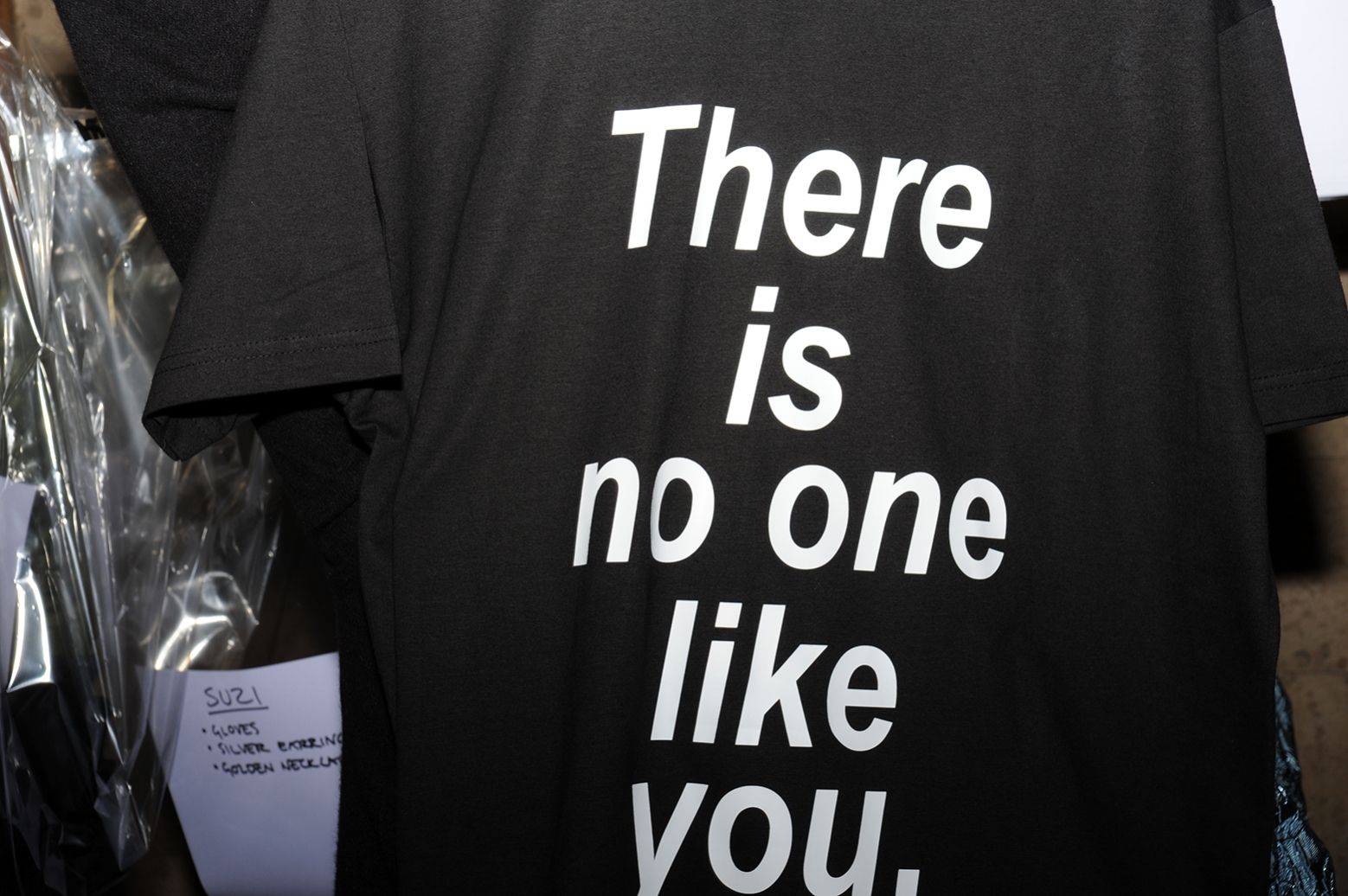
You’ve always combined your work with your independent brand with working with big and historical brands like Brioni, Delpozo and MaxMara. You have always stood for people who wear the clothes to be the protagonist and not yourself. Do you approach this idea in both your own brand and the others? And also, how do you reach a harmony between working for your own brand and for others?
It is exactly the same way of working, but I’m just dressing a different person. For example, Brioni was easy because it was menswear, it was a very classic man. You just need to think about who you are dressing, but differently. I’ve always seen it as a service: what would be the best thing for this brand and who’s the person who buys this brand. Then the approach is the same.
When working with MaxMara, I just look at what they need, who their customer is, what their DNA is. You just take it from there, and you use the same logic.
When I work for other people it is a service for the client. I can do the mad or crazy things at my own brand. I really like to work for other brands because you just channel your energy differently.
I feel that fashion is an industry with a lot of ego. It’s interesting that you say you want to be at the service of the brand, you don’t want to change it and be in the centre of it.
Yes, but honestly, having my own brand is also kind of an ego. It’s me saying “look what I’m doing, please wear it.” It’s ridiculous in a way, but it’s also about ego. I feel like I can leave my ego in my own brand, and then, in other companies, I do what is right for them.
But it always depends. For example, MaxMara is very easy because they have such a clear Brand DNA, the client is so concrete.
For Delpozo it was about keeping the beauty, but also making it more real. Make it for somebody who’s not on the red carpet, normal people. When I first met the owners of Delpozo they asked me “what would you do with this collection?”, and my response was “I would keep the beauty and unique vision, but make it more accessible for everybody.”
Fashion is always been so aspirational that it is also cool to make it accessible and real.
Yes, and it is nice to show possibilities. Then is up to people to decide if they like these proposals or not. In any case, once the collection is done, there’s nothing you can do. Just hoping that people will like it. Who cares about my ego if nobody is going to wear these clothes.
For your last FW21 presentation, you launched a video in which you were explaining the collection, and you even included a “DIY” kind of tip. It all had sort of an ‘amateur’ look -it was not a big production-. Why did you decide to do it that way?
It was somehow a practical decision. The collection was not available in France because it was still in Japan. I didn’t want to do something that was more than what it was. This collection was very easy, and it wasn’t conceptual at all. I’ve said that before, this is the least conceptual collection I have ever done. Mainly because I felt it was not the right moment to do something conceptual or extreme. I just got tired of anything that was not clear and to the point, times are so complicated anyway that I didn’t want more even more complications. I thought, how can I show this in the most honest way possible? And it was just to explain what was there.
About the DIY video, I had done several videos like that during the first lockdown. There was no more connection with people. When you design clothes, connections are so important. What’s the point of doing clothes if there’s no-one in front of you? I was also getting fed up with this idea that everything you do is to sell. I thought “what if we just give something for free?” Fashion is not only about pushing clothes, it is also about dressing, human interaction, showing people something... It was like “take a t-shirt and make something out of it.” Ignore all the surrounding complications. The easy invention of things.
And then I thought that I wanted to repeat this and just do something generous. That was basically the idea. And people actually reacted so positively. It was really nice to see.
As you said, there was zero production. It was just someone holding an iPhone while I was explaining. To be honest, now I just want to go back to show clothes again. There have been so many discussions about if shows make sense or not. But one thing that I’ve learnt during the last year is that they make incredible sense. It is about looking at something in front of you, it is about the moment, it is about something real that is out there. Filming clothes is so much more organized and controlled. What I like about fashion shows is that they are in real time, unpredictable, surprising.
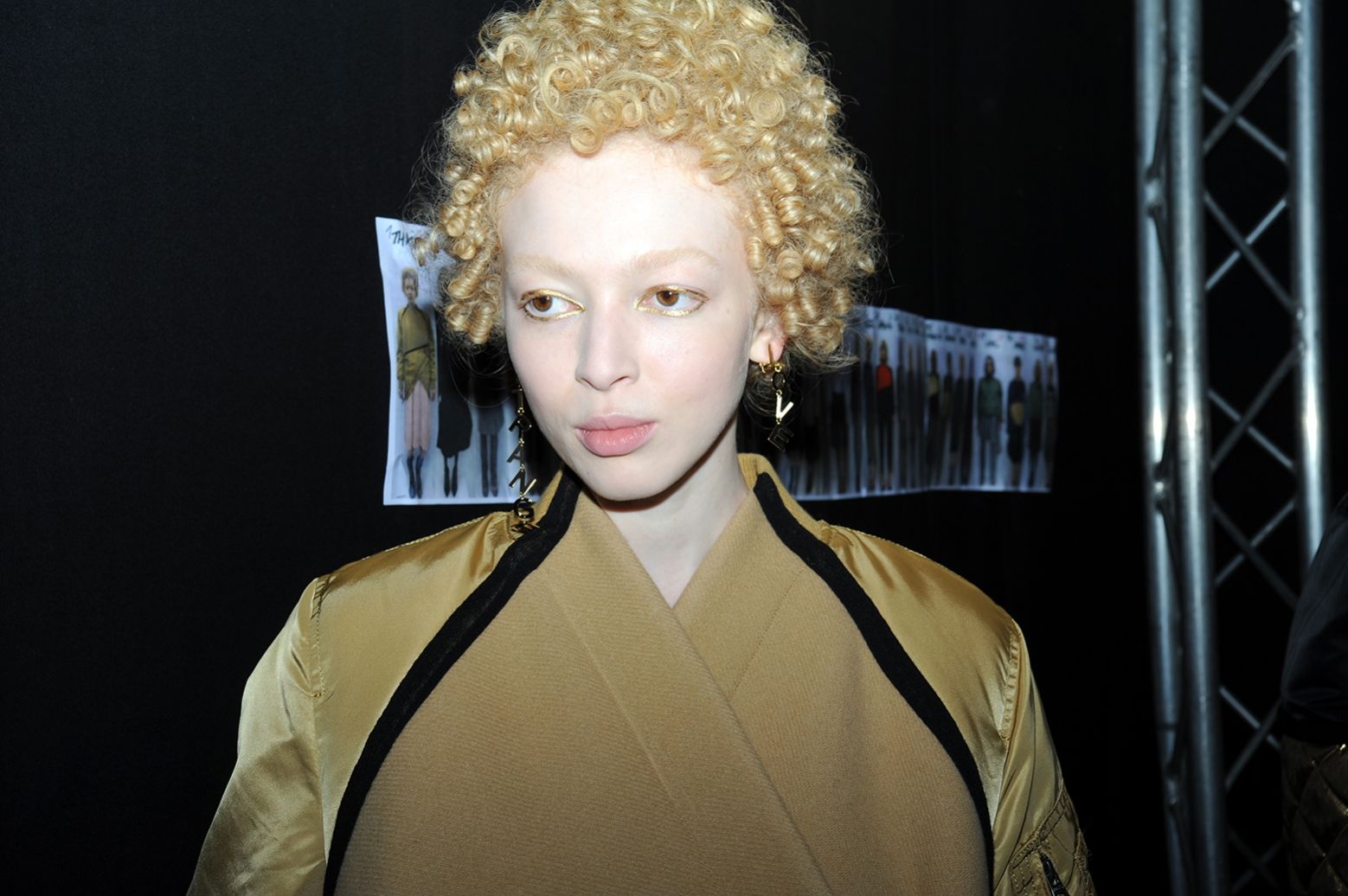
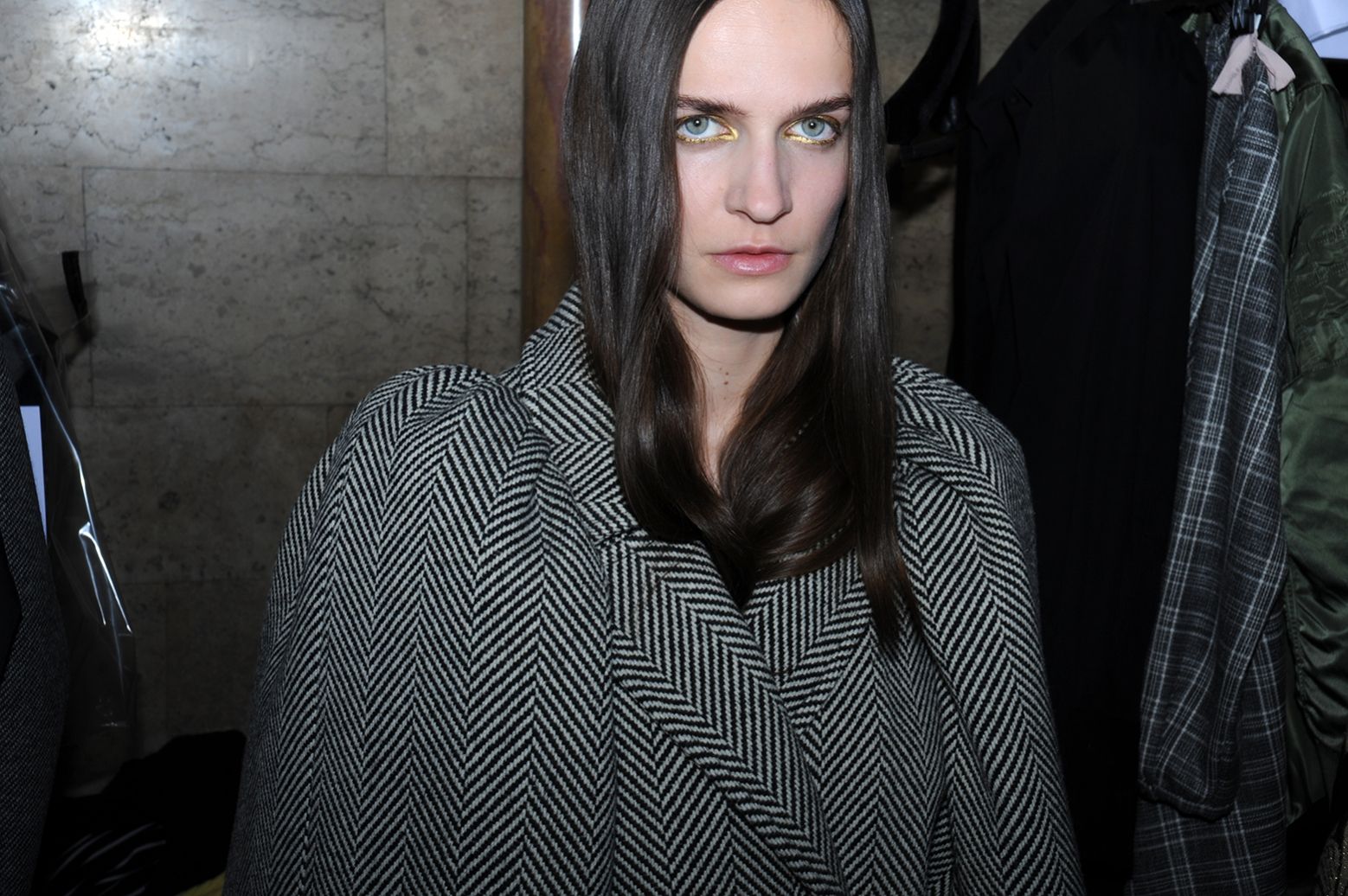
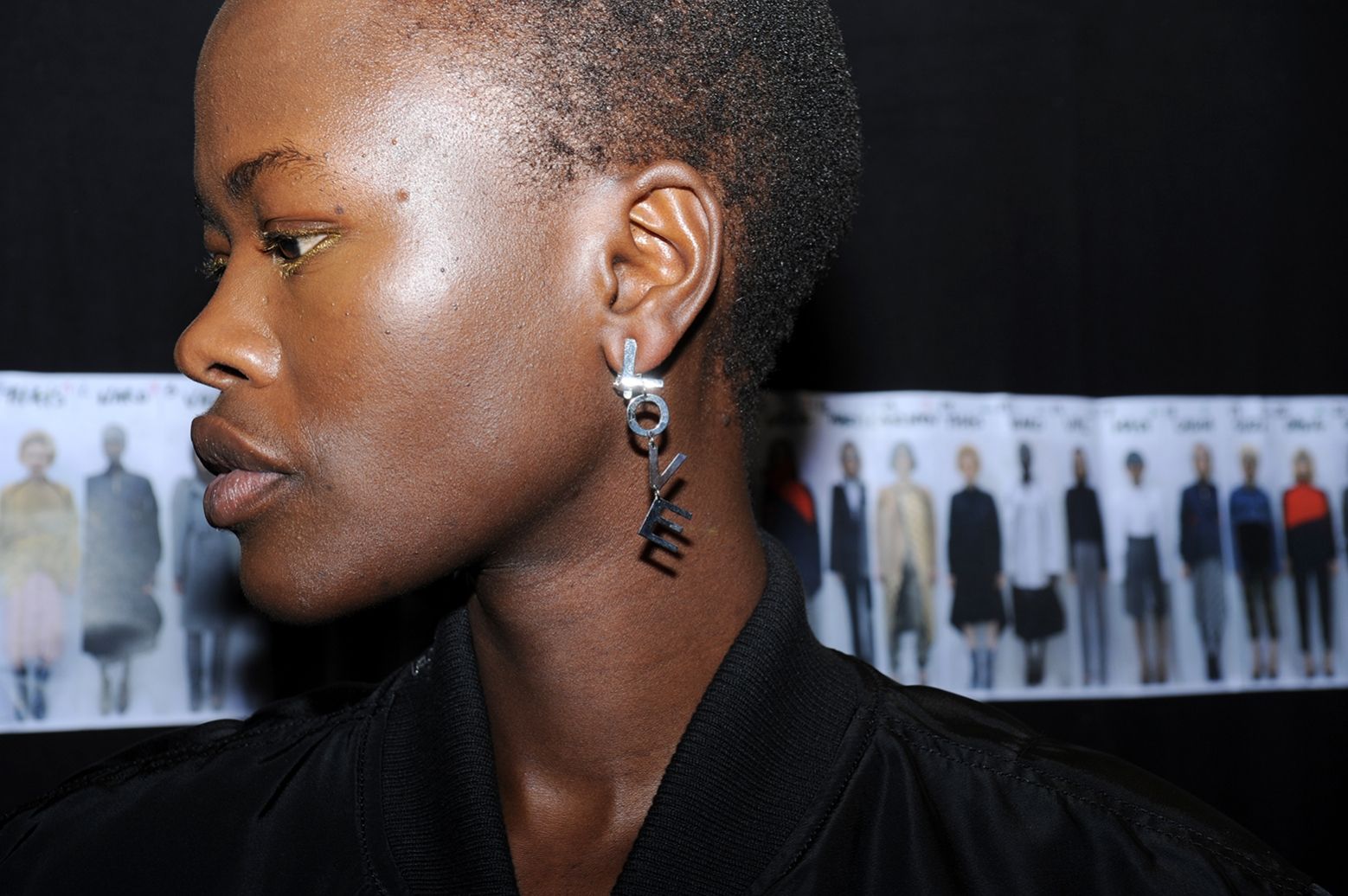
It is also much more emotional, right?
Yes! A screen doesn’t speak to me in the same way. That’s also one of the reasons for which I did not want to do a more elaborate film showing these clothes; it just does not feel emotional. We already have so many things happening via screens. Honestly, any idea that I came up with just felt wrong and pretentious, not right for the time. Fashion is about people, emotions.
You said this was your least conceptual collection. Reading interviews and looking at past collections, I’ve seen this has been a recurrent theme in your career: the idea of wearability in clothing. How important do you think it is to keep this wearability while maintaining the fantasy that has always been so present in fashion?
It actually depends on the moment. There are moments when you just explore and there are so many ideas, and sometimes there are not. The idea of wearability has always been central to me. Even if it is just one person out of 100 who wears the piece. It is funny that wearability is sometimes a dirty word. But honestly, if nobody wears your clothes what’s the point in designing them?
As long as it stays specific or unique in some way, as long as it conveys a message... Sometimes you do it in a more extreme way and sometimes easier. That’s how I’ve always worked. I always try to do what feels right for me for the moment.
I’ve read that one thing you love about fashion is that every six months there is a renewal. Do you think this constant renewal can co-exist with sustainability? And also, do you think it is affordable for shoppers?
I realized that the idea of remaking everything every six months is completely mad. Or even every three moths, because of pre-collections. But I’m also someone who gets bored very easily with things that become automatic.
When I was fourteen and living in Germany, I worked for three weeks in a factory during a summer holiday. It was literally the worst thing for me, it was so hard. I was doing the same movement all the time, and I was going completely mad. So when I say that I love the idea of renewal every six months it is just psychologically. I need constant change, renewal. I love the idea of going forward, keep your mind working.
The idea that you can completely reinvent yourself every six months is so positive and life-affirming for me. Every six months your life starts again. People sometimes feel like their lives are a constant and non-changeable, and that’s not true at all. The fact that fashion forces you to re-evaluate everything every six months is a life-saver for me.
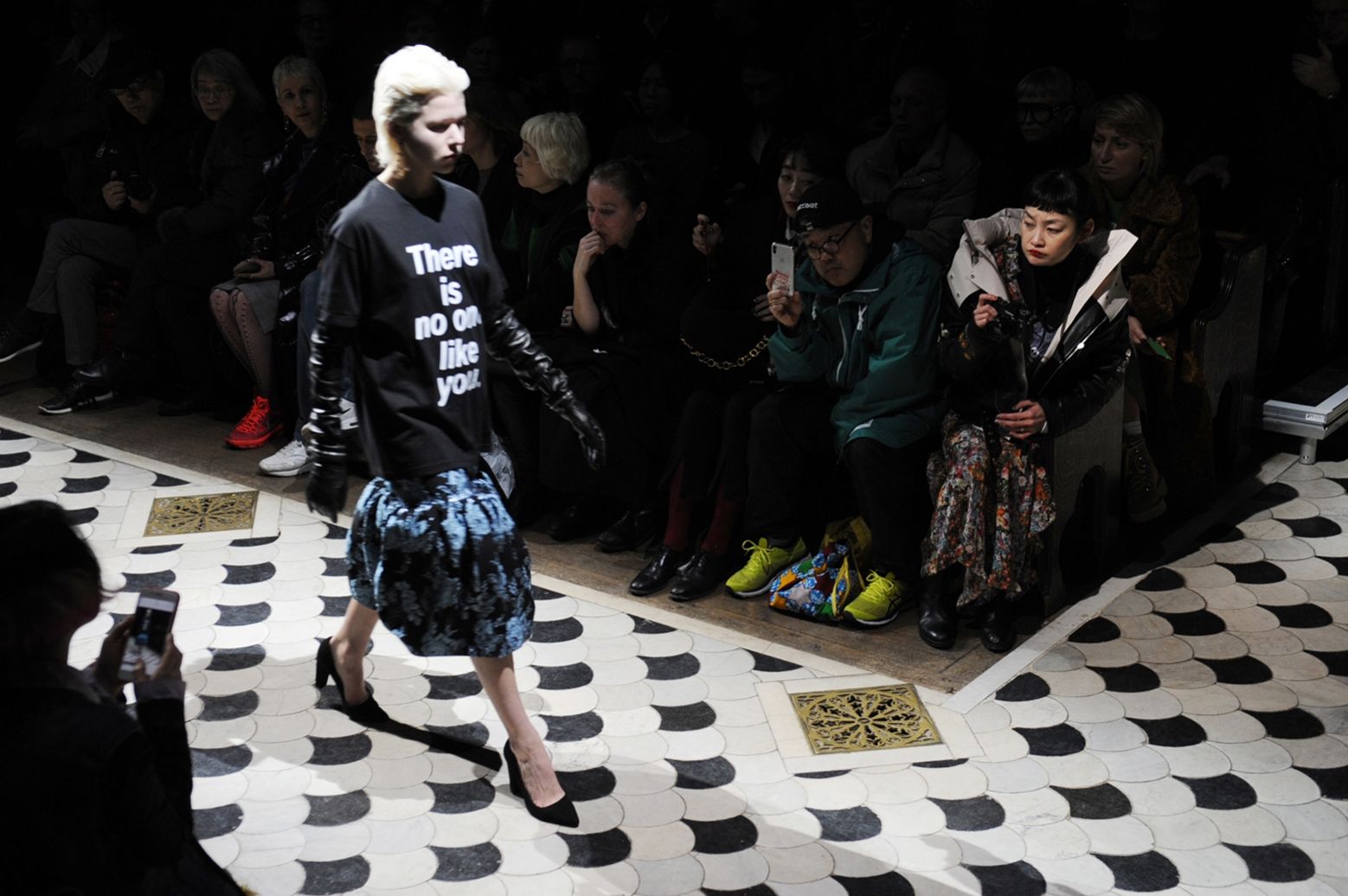
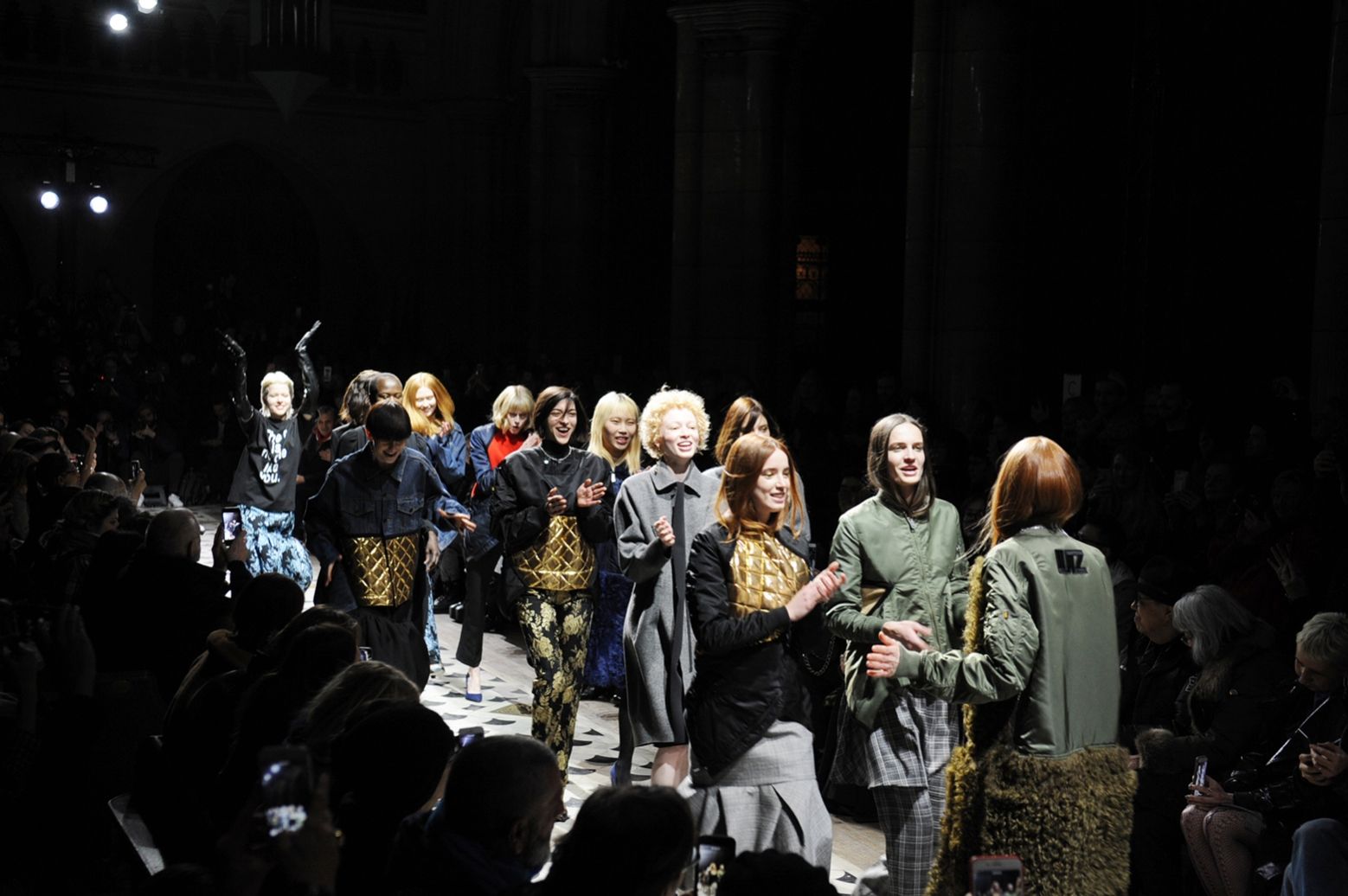
I can imagine that being an independent brand can sometimes be tough, mainly financially. We constantly see how big companies are absorbing smaller ones. Is that something you have thought about at some point? Or do you think that would mean a loss of creative independence as well?
I think it wouldn’t mean a loss of creativity because when you look at the collections of some very big houses out there, they are incredibly creative. I think creativity is an abstract idea. What you have to do is just make something that makes sense. And it is very important that collections are right for the moment, that they work.
I think you can sell creativity, and you can make a lot of money with creativity. And also, you can lose a lot of money with something that is not creative at all. This whole discussion is old in a way. If you find the right people, you have the same goal, and you understand each other, then the sky is the limit.
Look at Gucci, there is a CEO that understands everything. They all share the same vision and the same idea, then everything makes sense. For me, Gucci is actually an incredible story. I’m sure that not every CEO would’ve understood Alessandro Michèle explaining his vision, but he found somebody who did. And they made a huge success out of it. I think big success today is a mixture of business and creativity.
So we would be absolutely open to it. It is not always easy to be a small brand, especially now. Whenever the market is going through a difficult situation, small bands are the first to have problems. So I’m not someone who says I need to keep being independent to be able to protect my vision. I think my vision is very much compatible with bigger business.
There is something that lately, when I interview someone who is working in the fashion industry, I like to ask. Mainly because we are living such uncertain and changeable times, which would be your utopian fashion industry?
That is really difficult (laughs). I think I have no answer for that. Probably, we just have to be more careful in general when it comes to the human aspect of it all. I also think that people forget the value of a piece of clothing, how much work goes on it. People sometimes think our clothes are expensive, but I always want to say, do you know how much work goes into these pieces? You spent time choosing fabrics, colours, putting things together. You make a drawing, then the first prototype, the second one and sometimes even a third. It takes a lot of time and effort to make a piece of clothing.
If that became a little bit more clear, it would mean an incredible evolution. There’s passion and love behind all of these pieces.
What are your plans for the future? Do you think next fashion week is going to be taking place live?
My personal plan is, first of all, go out and get drunk (laughs). And apart from that, we haven’t made any plans yet. I don’t know if we are going to have a fashion show, I would love to do something, but I don’t know how this is going to work out. We have to be careful now, this hasn’t been an easy year. My plan is just to go back into life again, whatever that means, and whatever that entails.



LUTZ HUELLE: Fashion made for the people
APRIL 14, 2021 → WORDS JESÚS S FERRERA
A few days ago I jumped on a zoom call with Lutz Huelle. German fashion designer based in Paris at the helm of his eponymous independent label, which he has successfully combined with work for iconic and historical brands such as Brioni, MaxMara and Delpozo. It is undeniable that he has achieved harmony and a balance between the two, perhaps reserving the madness for his very own.
In an industry in which the ego can prevail, he stands for the people. He doesn’t want to be in the centre. Although he is aware that having his own brand is also a way of satisfying his ego, the people he is dressing has always been his greatest concern.
A few weeks ago he presented his Fall Winter 2021 collection at Paris Fashion Week. He has announced and described it as “the least conceptual collection” ever designed by himself. The world we are currently living in is already tough and confusing at times, something that Huelle doesn’t want to incorporate into his creative work. He refuses to confuse.
When asked about his utopian fashion industry he states that his biggest desire is for people to understand and appreciate everything that goes on behind a simple garment. There is love, there is passion, there are real people. Valuing the human aspect of it all is fundamental.
His words are honest and full of truth. His plans for the future in many respects may be blurred or undrawn, but they are clear on the most important thing: he wants to “go back into life again, whatever that means, and whatever that entails.” He is simply begging for a world with no more constraints.

First, I wanted to ask you how are you living these tough times. How has the social landscape changed you personally, and how has it changed the way you work?
Personally it has obviously changed me. It’s getting really hard now, to be honest. You don’t see people, you don’t go out for dinner or drinks anymore. It has made me realise how much I miss being with people. From that point of view I find it very difficult. It was kind of funny at the beginning, the first 2 weeks everything was new, Paris was completely empty, you could see no people. But once you get over the novelty of Paris being without people, it is not that nice anymore.
Regarding work, I have to say that it was interesting at the beginning, I had no clue what I was going to do. I normally go to the streets, I look at what people wear, how people dress, I travel to different places. It was nothing left in the way, so I had no idea what to get inspired by. Being always at home was obviously not really inspiring. But then I went back to what I was seeing at that moment: pyjamas, easy things... And I thought, “how can I turn that into something interesting?” Once that I had an idea, it became easier. But it is not the same as being able to go out and see things. It was an interesting exercise, but I’m kind of fed up with it now.
This situation has also led to general changes in the industry. How do you rate all of these changes? Do you think the fashion industry is going towards a better place?
I don’t know, to be honest. I have no idea how much of what people are saying now is going to be kept once the situation is better. I’m optimistic, so I hope that things will get better in many ways, there are so many things that should change. Apart from the sustainable aspect, it is also that so many clothes are made, they are all going to sale so quickly that there’s never a moment when people actually see the clothes properly in the stores. You can’t buy properly. There’s a new collection, it goes to the stores, and it goes on sales. The whole thing is so fast. I do hope that things will get better.
You said that people and traveling are some of your sources of inspiration. What else can you say about that matter?
When I first started, I just kept wondering how our lives were changing. I thought: people are going to go out much more, and they are not going to wear one outfit for the office, one outfit for the evening... I thought all these things were going to be mixed together. People were going to wear clothes that do all these things at once. Clothes that are multicultural, multifunctional. So when I first started I thought I did not want to have any limits to how I will design the collections. I mixed sport-wear, evening, menswear...
I was also looking at my friends, people around me. They are all dressing in such and easy and simple way. A simple t-shirt with a very expensive jacquard... Whatever. I think there was a big difference between how people were dressing and what I was seeing at fashion shows, and I was interested in how people were actually dressing.
Now that I’ve been doing this for a while, I always look at my own work. I always try to keep the last four seasons on my wall, and I look at what I like, what I think might be better, what is still interesting, what is old now, what I don’t like anymore. The Collection is always inspired by the preceding one.
I also look a lot at what people are wearing, the way clothes fall, the way fabrics move together.
And then, I’ve always loved music. I’ve always had a feeling in my head with what I listen to at the moment. That has always been a huge inspiration, but I can’t explain how, because it’s not visual, it’s something in my head. Music makes me feel a certain way.
There are also designers that I love: Pierre Cardin in the 60s or Comme des Garçons, which are still amazing.
But at the end of the day, it is always about who is the person that you are dressing. I like to dress people that care about fashion but not too much. Who would just put things on, who just want to look interesting or sexy but without being fashion victims. Something that is just easy, almost non-fashion.


You’ve always combined your work with your independent brand with working with big and historical brands like Brioni, Delpozo and MaxMara. You have always stood for people who wear the clothes to be the protagonist and not yourself. Do you approach this idea in both your own brand and the others? And also, how do you reach a harmony between working for your own brand and for others?
It is exactly the same way of working, but I’m just dressing a different person. For example, Brioni was easy because it was menswear, it was a very classic man. You just need to think about who you are dressing, but differently. I’ve always seen it as a service: what would be the best thing for this brand and who’s the person who buys this brand. Then the approach is the same.
When working with MaxMara, I just look at what they need, who their customer is, what their DNA is. You just take it from there, and you use the same logic.
When I work for other people it is a service for the client. I can do the mad or crazy things at my own brand. I really like to work for other brands because you just channel your energy differently.
I feel that fashion is an industry with a lot of ego. It’s interesting that you say you want to be at the service of the brand, you don’t want to change it and be in the centre of it.
Yes, but honestly, having my own brand is also kind of an ego. It’s me saying “look what I’m doing, please wear it.” It’s ridiculous in a way, but it’s also about ego. I feel like I can leave my ego in my own brand, and then, in other companies, I do what is right for them.
But it always depends. For example, MaxMara is very easy because they have such a clear Brand DNA, the client is so concrete.
For Delpozo it was about keeping the beauty, but also making it more real. Make it for somebody who’s not on the red carpet, normal people. When I first met the owners of Delpozo they asked me “what would you do with this collection?”, and my response was “I would keep the beauty and unique vision, but make it more accessible for everybody.”
Fashion is always been so aspirational that it is also cool to make it accessible and real.
Yes, and it is nice to show possibilities. Then is up to people to decide if they like these proposals or not. In any case, once the collection is done, there’s nothing you can do. Just hoping that people will like it. Who cares about my ego if nobody is going to wear these clothes.
For your last FW21 presentation, you launched a video in which you were explaining the collection, and you even included a “DIY” kind of tip. It all had sort of an ‘amateur’ look -it was not a big production-. Why did you decide to do it that way?
It was somehow a practical decision. The collection was not available in France because it was still in Japan. I didn’t want to do something that was more than what it was. This collection was very easy, and it wasn’t conceptual at all. I’ve said that before, this is the least conceptual collection I have ever done. Mainly because I felt it was not the right moment to do something conceptual or extreme. I just got tired of anything that was not clear and to the point, times are so complicated anyway that I didn’t want more even more complications. I thought, how can I show this in the most honest way possible? And it was just to explain what was there.
About the DIY video, I had done several videos like that during the first lockdown. There was no more connection with people. When you design clothes, connections are so important. What’s the point of doing clothes if there’s no-one in front of you? I was also getting fed up with this idea that everything you do is to sell. I thought “what if we just give something for free?” Fashion is not only about pushing clothes, it is also about dressing, human interaction, showing people something... It was like “take a t-shirt and make something out of it.” Ignore all the surrounding complications. The easy invention of things.
And then I thought that I wanted to repeat this and just do something generous. That was basically the idea. And people actually reacted so positively. It was really nice to see.
As you said, there was zero production. It was just someone holding an iPhone while I was explaining. To be honest, now I just want to go back to show clothes again. There have been so many discussions about if shows make sense or not. But one thing that I’ve learnt during the last year is that they make incredible sense. It is about looking at something in front of you, it is about the moment, it is about something real that is out there. Filming clothes is so much more organized and controlled. What I like about fashion shows is that they are in real time, unpredictable, surprising.



It is also much more emotional, right?
Yes! A screen doesn’t speak to me in the same way. That’s also one of the reasons for which I did not want to do a more elaborate film showing these clothes; it just does not feel emotional. We already have so many things happening via screens. Honestly, any idea that I came up with just felt wrong and pretentious, not right for the time. Fashion is about people, emotions.
You said this was your least conceptual collection. Reading interviews and looking at past collections, I’ve seen this has been a recurrent theme in your career: the idea of wearability in clothing. How important do you think it is to keep this wearability while maintaining the fantasy that has always been so present in fashion?
It actually depends on the moment. There are moments when you just explore and there are so many ideas, and sometimes there are not. The idea of wearability has always been central to me. Even if it is just one person out of 100 who wears the piece. It is funny that wearability is sometimes a dirty word. But honestly, if nobody wears your clothes what’s the point in designing them?
As long as it stays specific or unique in some way, as long as it conveys a message... Sometimes you do it in a more extreme way and sometimes easier. That’s how I’ve always worked. I always try to do what feels right for me for the moment.
I’ve read that one thing you love about fashion is that every six months there is a renewal. Do you think this constant renewal can co-exist with sustainability? And also, do you think it is affordable for shoppers?
I realized that the idea of remaking everything every six months is completely mad. Or even every three moths, because of pre-collections. But I’m also someone who gets bored very easily with things that become automatic.
When I was fourteen and living in Germany, I worked for three weeks in a factory during a summer holiday. It was literally the worst thing for me, it was so hard. I was doing the same movement all the time, and I was going completely mad. So when I say that I love the idea of renewal every six months it is just psychologically. I need constant change, renewal. I love the idea of going forward, keep your mind working.
The idea that you can completely reinvent yourself every six months is so positive and life-affirming for me. Every six months your life starts again. People sometimes feel like their lives are a constant and non-changeable, and that’s not true at all. The fact that fashion forces you to re-evaluate everything every six months is a life-saver for me.


I can imagine that being an independent brand can sometimes be tough, mainly financially. We constantly see how big companies are absorbing smaller ones. Is that something you have thought about at some point? Or do you think that would mean a loss of creative independence as well?
I think it wouldn’t mean a loss of creativity because when you look at the collections of some very big houses out there, they are incredibly creative. I think creativity is an abstract idea. What you have to do is just make something that makes sense. And it is very important that collections are right for the moment, that they work.
I think you can sell creativity, and you can make a lot of money with creativity. And also, you can lose a lot of money with something that is not creative at all. This whole discussion is old in a way. If you find the right people, you have the same goal, and you understand each other, then the sky is the limit.
Look at Gucci, there is a CEO that understands everything. They all share the same vision and the same idea, then everything makes sense. For me, Gucci is actually an incredible story. I’m sure that not every CEO would’ve understood Alessandro Michèle explaining his vision, but he found somebody who did. And they made a huge success out of it. I think big success today is a mixture of business and creativity.
So we would be absolutely open to it. It is not always easy to be a small brand, especially now. Whenever the market is going through a difficult situation, small bands are the first to have problems. So I’m not someone who says I need to keep being independent to be able to protect my vision. I think my vision is very much compatible with bigger business.
There is something that lately, when I interview someone who is working in the fashion industry, I like to ask. Mainly because we are living such uncertain and changeable times, which would be your utopian fashion industry?
That is really difficult (laughs). I think I have no answer for that. Probably, we just have to be more careful in general when it comes to the human aspect of it all. I also think that people forget the value of a piece of clothing, how much work goes on it. People sometimes think our clothes are expensive, but I always want to say, do you know how much work goes into these pieces? You spent time choosing fabrics, colours, putting things together. You make a drawing, then the first prototype, the second one and sometimes even a third. It takes a lot of time and effort to make a piece of clothing.
If that became a little bit more clear, it would mean an incredible evolution. There’s passion and love behind all of these pieces.
What are your plans for the future? Do you think next fashion week is going to be taking place live?
My personal plan is, first of all, go out and get drunk (laughs). And apart from that, we haven’t made any plans yet. I don’t know if we are going to have a fashion show, I would love to do something, but I don’t know how this is going to work out. We have to be careful now, this hasn’t been an easy year. My plan is just to go back into life again, whatever that means, and whatever that entails.